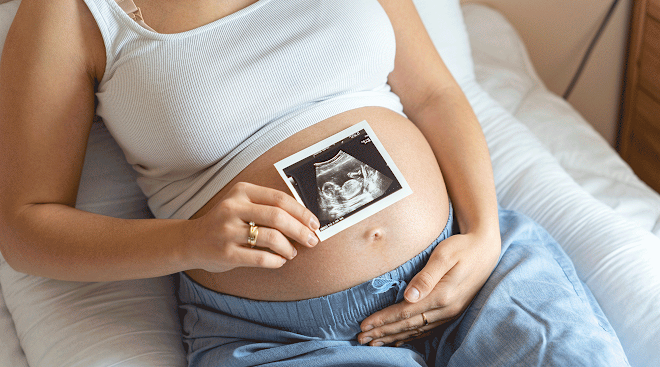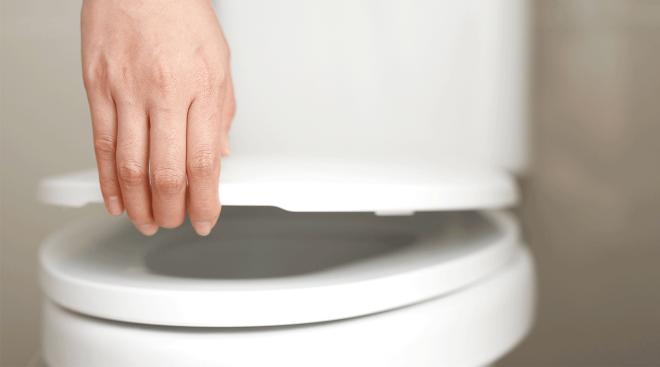How Your Vaginal Discharge Can Change During Pregnancy
When you become pregnant, you expect your body to change—but you probably never considered how pregnancy would affect your vaginal discharge. Surprise!
Even immediately after conception, the consistency, color and odor of your pregnancy discharge is likely to change due to hormone fluctuation. And if you’re not up to speed on those changes, things can sometimes feel pretty strange down there. Right off the bat, you may find yourself with questions—like, what does pregnancy discharge look like? Is this smell normal? And when should I be concerned?
Knowing what to anticipate is important, which is why we’ve talked to experts to get the lowdown on what’s normal vaginal discharge during pregnancy, what your vaginal discharge color might mean (and trust us, there’s a rainbow of possible discharge colors) and when you should call your doctor. Follow our guide to find out everything you need to know about pregnancy discharge.
Normal pregnancy discharge is milky white or clear in color and consistency, says Sherry Ross, MD, women’s sexual health expert and author of She-ology and She-ology, the She-quel. “It typically starts in the first trimester, becomes more noticeable as pregnancy progresses and is heaviest in the last weeks of pregnancy,” she adds.
Vaginal discharge during pregnancy serves an important purpose: to help prevent infections from traveling up the uterus, notes Cleveland Clinic. Also, don’t be alarmed—there tends to be more discharge during pregnancy due to the extra hormones circulating, such as estrogen and progesterone.
Hormones play a big role in changes to your vaginal discharge during pregnancy. Estrogen can thin out your pregnancy discharge, while progesterone thickens it, explains Kimberly Langdon, MD, an obstetrician and medical advisor for digital health company Medzino. Progesterone reaches its highest levels in the third trimester, says Cleveland Clinic, which is why you’re likely to see thicker pregnancy discharge. As you get closer to your due date, the color may change and it may become thicker, stickier and more mucus-like, says Ross.
You’ll eventually see what’s known as your mucus plug—aka the clump of mucus that helps keep the opening of the cervix closed. Losing the mucus plug—which can be clear, off-white or slightly blood-tinged—can be a sign that labor is on its way, but it’s by no means a guarantee, notes Cleveland Clinic.
Again, pregnancy discharge is typically milky white or clear—but if it’s a different color, it doesn’t necessarily mean something is wrong. For example, you may see some spotting in the week following conception. Called implantation bleeding, this is due to the fertilized egg attaching itself to the uterus. While slight spotting throughout pregnancy (i.e. a few specks of blood on your underwear or a streak when you wipe) isn’t abnormal, it’s something an ob-gyn would want to know about and monitor, says Nicolle S. Underwood, MD, is an ob-gyn at Pacific Women’s Healthcare Associates in Irvine, California, so let your doctor know if you see any blood.
Here’s a full rundown of the vaginal discharge colors that may make an appearance in your underwear during pregnancy:
Vaginal discharge during pregnancy color chart
Clear vaginal discharge
Commonly referred to as leukorrhea, this early pregnancy discharge is normal.
Cream-colored vaginal discharge
Early pregnancy discharge can also have a whitish hue (like the color of skim milk). If the white vaginal discharge is accompanied by itching or burning, however, it could be a sign of a yeast infection or bacterial infection, says Ross. Be sure to check in with your provider.
Clear, stringy, mucusy vaginal discharge
During late pregnancy, this discharge is likely part of the mucus plug. This may come out all at once (think: a tablespoon of a jelly-like substance) or may come out in bits and pieces during the last weeks of pregnancy, according to Cleveland Clinic.
Tan vaginal discharge
Vaginal discharge color resembling the hue of creamy coffee could also signify a yeast infection. The discharge may also be clumpy and have an unusual odor, Underwood says.
Dark brown vaginal discharge
Dark brown discharge during pregnancy could be dried blood leaving your body, Underwood explains. A few streaks when you wipe may be normal—especially if the brown is a jelly-like consistency, which could be part of your mucus plug—but more than a few streaks should be discussed with your doctor.
Green vaginal discharge
Green, foul-smelling pregnancy discharge could be a sign of an infection like chlamydia or trichomoniasis, Langdon says. This may be accompanied by itching or burning. Be sure to discuss this with your doctor, says Ross.
Yellow vaginal discharge
Yellow discharge during pregnancy could also be a sign of an infection, according to the American Pregnancy Association (APA). This is another one that’s worth mentioning to your doctor, says Ross.
Gray vaginal discharge
Thin, fishy smelling, gray vaginal discharge could signify an infection like bacterial vaginosis (BV), which requires treatment from a doctor, Langdon says.
Pink vaginal discharge
Pink pregnancy discharge could signify blood. It doesn’t necessarily mean something is wrong, but if it’s persistent it’s a good idea to discuss it with your doctor, no matter the amount, says Ross. Note that sex during pregnancy can cause spotting from the cervix due to the increase in blood flow to your pelvic area, she adds.
Red vaginal discharge
Red vaginal discharge is also a sign of blood and warrants medical attention, says Ross, adding that it’s a particular concern if it’s heavy or persistent. “Bleeding in the first trimester doesn’t mean that you’ll inevitably have a miscarriage,” Langdon says. Instead, it could be a sign of an infection or could indicate an issue like placenta previa, where the placenta lies over the cervix. This isn’t an emergency, but it does require monitoring.
The best way to deal with pregnancy discharge is to keep the area clean, says Ross. It’s also a good idea to wear cotton underwear and avoid tight pants or pantyhose, as well as products such as perfumed soaps and sprays. You can wear a pantyliner, says Ross (avoid scented or perfumed ones), but steer clear of tampons and douches, warns Underwood, as putting anything in the vagina during pregnancy could increase your risk of infection. These tips “will help prevent irritation and infection, and keep you comfortable during pregnancy,” says Ross.
If you’re concerned about your vaginal discharge during pregnancy, don’t hesitate to call your doctor, particularly if the discharge is yellow, green, red or gray, has a foul odor or you’re experiencing itching or burning, says Ross.
“If there’s a sudden change in color, consistency, smell, itching, burning, redness or new onset of pain or discomfort during urination or sexual intercourse, seeing a provider is recommended,” says Ross.
During later pregnancy, if you’re experiencing significant dampness, it could potentially signal an amniotic rupture that needs immediate attention. Since amniotic fluid is clear and odorless, it can be hard to discern from typical pregnancy discharge. One way to assess: Put on a new pair of underpants or a new pantyliner for an hour. If you’re noticeably damp or wet after an hour, Underwood says, it may be a good idea to call your doctor.
You’re going to notice a lot of changes in your body during the course of your pregnancy, and some of those may show up in your pregnancy discharge. While vaginal discharge during pregnancy is totally normal, it’s important to keep an eye on it as it can tell you a lot about what your body is going through. And if you’re still in doubt, don’t hesitate to bring it up at your next prenatal appointment. “We talk about this all day, so if you have any questions, we want to know,” Underwood says.
Please note: The Bump and the materials and information it contains are not intended to, and do not constitute, medical or other health advice or diagnosis and should not be used as such. You should always consult with a qualified physician or health professional about your specific circumstances.
Plus, more from The Bump:
Kimberly Langdon, MD, is an obstetrician and medical advisor for digital health company Medzino. She earned her medical degree from The Ohio State University College of Medicine.
Sherry Ross, MD, is an ob-gyn and women’s sexual health expert. She’s the author of She-ology: The Definitive Guide to Women’s Intimate Health. Period. and She-ology, the She-quel: Let's Continue the Conversation. She received her medical degree from New York Medical College.
Nicolle S. Underwood, MD, is an ob-gyn at Pacific Women’s Healthcare Associates in Irvine, California. She earned her medical degree from Sidney Kimmel Medical College at Thomas Jefferson University.
Cleveland Clinic, Vaginal Discharge, July 2022
Cleveland Clinic, Mucus Plug, July 2021
American Pregnancy Association, Vaginal Discharge During Pregnancy
Learn how we ensure the accuracy of our content through our editorial and medical review process.
Navigate forward to interact with the calendar and select a date. Press the question mark key to get the keyboard shortcuts for changing dates.





















































